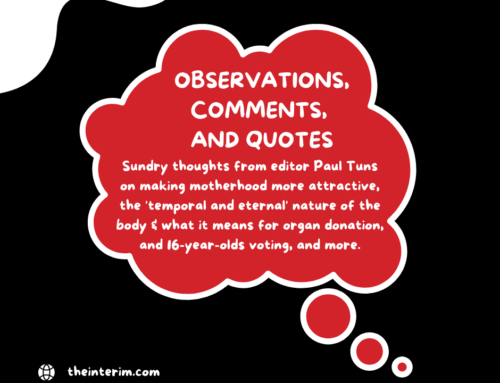The first appearance of the word “euthanasia” in English occurs in Francis Bacon’s discussion of incurable diseases. He exhorts doctors to tend to the terminally ill, for the “office of the physician” is “not only to restore health, but to mitigate pain and dolors,” even when it may only “serve to make…de euthanasia exteriore.” That doctors should assist their suffering patients in making an “outward good-death” –leaving their inner preparation to the physicians of the soul – is advice not original to him; instead, his admonition is to fulfill the sacred duties of a Christian towards the sick, while abiding by Western medicine’s Magna Carta, the Hippocratic Oath: “Nor shall any man’s entreaty prevail upon me to administer poison to anyone; neither will I counsel any man to do so.”
Contemporary medical science has soared to heights unimaginable by ancients and early moderns alike; and yet, with their clear uncompromising morals, it is they who now surpass us. We have willfully forgotten what they always knew about the sanctity of life at its beginning and its end. For, since time immemorial, men have known that life is an incarnate mystery, a gratuitous lived gift with a source and destiny beyond the horizons of the human senses. As Rilke says: “Our own heart transcends us still, as do the gods,” a poetic intuition which explains why, across human cultures, suicide and senicide have almost always been decried as crimes. How is it, then, that a civilization as advanced as our own has returned to the desperate ethics of the ice floe?
Sadly, it would seem that our progress is in inverse relation to our spiritual health: we delve beneath the world of appearance with the microscope, but fail to see the plain difference between evil and good; we doubt the reality of any afterlife, and so create a hell for ourselves in the present age; we develop amazing means of healing and helping the sick and suffering, yet make them feel like symptoms to be suppressed in the mad pursuit of our own self-interest. Our quest for freedom, pleasure, and triumph produces only servitude, sorrow, and humiliation – for other and for ourselves.
To minds deluded by the pernicious Promethean attitude of our age, assisted suicide and euthanasia seem like means for preserving life’s bright perimeter of pleasure by fixing an arbitrary, deadly limit beyond which it may not shrink. But when death comes to be numbered among life’s possibilities, a painful paradox follows: life’s meaning is hollowed out from the inside. In place of absolute prohibitions against death by suicide or by the medical collusion to commit murder, any flimsy criteria we might propose quickly warp and twist and fade in the terrifying presence of life’s great enemy. Thus, what starts as an option only for the strong-willed few invariably turns into a requirement for everyone who fails against an impossible standard of perfection and satisfaction. The Netherlands introduced such a series of carefully crafted laws a decade ago; last year, 650 infants were euthanized.
We must remind our imperious judges (and our pusillanimous politicians) that the only true “good death” is the one that God gives – the one, that is, that charity impels us to provide for the sick, the elderly, and infirm: one with real dignity, in which the most advanced medical treatment is joined with an attitude of deep solicitude and care. We must fearlessly affirm that anything less is barbarism, for death makes a bad doctor; life is never a disease.




